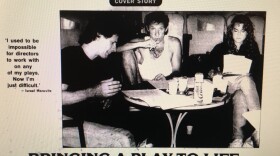
Rhaina Cohen
Rhaina Cohen is a producer and editor for NPR's Enterprise Storytelling unit, working across Embedded, Invisibilia, and Rough Translation.
Previously, she was a producer for Hidden Brain, where she brought together narrative journalism and social science research. Some of the most rewarding stories she worked on include those about why the #MeToo movement took off when it did, how American masculinity makes it harder for men to build close friendships and why we sometimes make decisions that baffle us. Cohen joined NPR as an intern for Planet Money.
She periodically writes for outlets such as The Atlantic, The Washington Post, and The New Republic. Her article about people who make a friend their life partner was selected by Longreads as one of the best articles of 2020. She received some of her earliest journalism training as a research assistant for authors. She worked on the New York Times bestselling book All The Single Ladies: Unmarried Women and the Rise of an Independent Nation and the biography Michelle Obama: A Life.
Cohen was a Marshall Scholar at Oxford, where she earned a master's in comparative social policy (and while there, competed in a dance style that hasn't yet taken off in the United States: acrobatic rock 'n' roll). She holds a bachelor's degree in American Studies from Northwestern University. As a 2018 FASPE fellow, she studied journalism ethics in Germany and Poland.
-
Buying a home is a conventional milestone for couples. But as home prices skyrocket, many Americans are buying homes with someone who isn't their romantic partner.
-
Thousands of years ago, there was a ceremony to bind close friends together as sworn siblings. Could the practice be resurrected today to strengthen modern friendships? Two women did just that.
-
In the latest story in the NPR's series The Science of Siblings, we hear about a practice that dates back to ancient times that allows people to turn a friend into a sibling.
-
The demand for "proper" English can be used to shut people out of spaces and opportunities. The folks at NPR's "Rough Translation" podcast have a story to tell.
-
After the shooting at the Capital Gazette newspaper, the surviving staff resolve to rebuild their paper.
-
Death may be inescapable, but we do our best to avoid thinking about it. Psychologist Sheldon Solomon says we're not very successful though. This week on Hidden Brain, we confront how death anxiety courses through our actions, even when we don't realize it.
-
Social media sites offer quick and easy ways to share ideas, crack jokes, find old friends. But the things we post don't go away. We explore how one teenager's social media posts destroyed an opportunity he'd worked for all his life.
-
Does living with animals really make us healthier? Why do we eat some animals and keep others as pets? This week on Hidden Brain, we talk with psychology professor Hal Herzog about the contradictions embedded in our relationships with animals.
-
Companies flush with cash are choosing to use some of that money to buy back their own stock shares, instead of investing in new products or raises for employees. So, is this a good trend?
-
Decades ago, a group of women accused a prominent playwright of sexual misconduct. For the most part, the complaints went nowhere. In 2017, more women came forward. This time, people listened.







